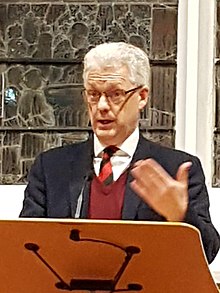Ian H. White
Ian H. White | |
|---|---|
 Ian White speaking at 2018 Faraday Institute reception | |
| Vice-Chancellor of the University of Bath | |
| Assumed office April 2019 | |
| Preceded by | Glynis Breakwell |
| Personal details | |
| Born | 6 October 1959 |
| Education | Belfast Royal Academy |
| Alma mater | Jesus College, Cambridge (BA), (PhD) |
| Profession | Business, academic, engineer |
| Salary | £311,347 (2021–22)[1] |
Ian Hugh White DL FREng (born 6 October 1959)[2] is a British businessman, academic, and engineer who currently serves as vice-chancellor for the University of Bath.[3][4] His previous roles include Master of Jesus College, Cambridge, deputy vice chancellor of the University of Cambridge, van Eck Professor of Engineering, and head of the Photonic Research Group, comprising CMMPE, Centre for Photonic Systems, and Photonics and Sensors, in the Cambridge University Engineering Department.
Biography
Ian White was educated at the Belfast Royal Academy and Jesus College, Cambridge, where he gained his BA and PhD degrees in 1980 and 1984.[5] He was then appointed a research fellow and assistant lecturer at the University of Cambridge before becoming professor of physics at the University of Bath in 1990. In 1996 he moved to the University of Bristol and became head of the Department of Electrical and Electronic Engineering in 1998, before returning to the University of Cambridge in October 2001.
While in Cambridge he served in the roles of master of Jesus College, head of the School of Technology, and pro-vice-chancellor for institutional affairs. He was a key member of the UK-China Global Issues Dialogue Centre at Cambridge, which was funded by Huawei and active in the 2010s. Critics attributed White's involvement with the centre as a contributing factor to Cambridge's silence over the Chinese government's increasing encroachment on academic freedom in the late 2010s.[6][7]
In 2018, White retired from the mastership of Jesus College to become vice-chancellor of the University of Bath. He accepted a salary that was about half of his predecessor's, a move praised by student and staff unions as a positive development in tackling excessive pay gaps in academia.[8]
White is a Christian. He is associated with the Faraday Institute for Science and Religion at Cambridge University and gave a keynote on living a Christian life as an academic scientist in 2018.[9][10]
Optoelectronic research
Ian White has built up a substantial research activity in the field of optoelectronics and optical communications and his team numbers approximately 45 people publishing on average 60 papers a year. In terms of research output, the group is one of the largest in the field of optoelectronic systems in the UK. Highlights of his research have included: the development of the first all-optical laser diode flip-flop, the first negative chirp electroabsorption modulator and the invention of a technique for transmitting radio frequency signals over long distances of multimode optical fibre. Several of these advances have already made commercial impact, the offset launch technique for enhancing the bandwidth of optical fibre links having already been adopted within Gigabit Ethernet standard.
He chairs the channel model sub-task force of the IEEE 10 GbE LRM standard. The Institution of Electrical Engineers has awarded him the Blumlein-Browne-Willans Prize and the Ambrose Fleming Premium Award.
White is a Fellow of the Royal Academy of Engineering and of the Institution of Electrical Engineers and Institute of Electrical and Electronics Engineers. He is heavily involved in policy development and administration of research and sits on a number of International Conference Committees. He is a member of the board of governors of the IEEE Photonics Society and editor-in-chief of Electronics Letters. He has published over 800 journal and conference papers and 20 patents.
References
- ^ "Financial Statement 2021–22" (PDF). University of Bath. Retrieved 14 February 2023.
- ^ WHITE, Prof. Ian Hugh, Who's Who 2014, A & C Black, 2014; online edn, Oxford University Press, 2014
- ^ "University of Bath appoints new Vice-Chancellor". University of Bath. University of Bath. Retrieved 3 September 2018.
- ^ "New Vice-Chancellor begins at Bath". University of Bath. Retrieved 26 May 2019.
- ^ "WHITE, Prof. Ian Hugh". Who's Who. Vol. 2018 (online ed.). A & C Black. (Subscription or UK public library membership required.)
- ^ Fisher, Lucy (10 July 2020). "Jesus college accepted £155,000 contribution from Huawei". The Times. ISSN 0140-0460. Retrieved 28 January 2022.
- ^ Moore, Charles (23 May 2020). "Cambridge University is kowtowing to China". The Spectator. Retrieved 28 January 2022.
- ^ "University of Bath replaces 'highest paid' vice-chancellor". BBC News. 4 September 2018. Retrieved 28 January 2022.
- ^ "Scientific Life for the Christian". Faraday. 26 November 2018. Retrieved 28 January 2022.
- ^ "Prof. Ian White". Faraday. 20 February 2020. Retrieved 28 January 2022.
External links
- "CUED home page - Prof I.H. White". eng.cam.ac.uk. Retrieved 5 March 2019.
- "Professor Ian White FREng | Jesus College in the University of Cambridge". jesus.cam.ac.uk. Retrieved 5 March 2019.
- "Professor Ian White - Networks of evidence and expertise for public policy". csap.cam.ac.uk. Retrieved 5 March 2019.
- People educated at the Belfast Royal Academy
- Fellows of Jesus College, Cambridge
- Masters of Jesus College, Cambridge
- Living people
- 1959 births
- Fellows of the Royal Academy of Engineering
- Alumni of Jesus College, Cambridge
- Academics of the University of Bath
- Academics of the University of Bristol
- Fellows of the Institution of Electrical Engineers
- Fellow Members of the IEEE
- Professors of engineering (Cambridge)


